From October 23 to October 30, under the guidance of three faculty members from the School of Energy Science and Engineering at Harbin Institute of Technology Prof. Han Lei, Dr. Li Xin, and Prof. Li Lifeng, nine PhD students including Chen Kun, Hu Qiming, Wang Junli, Bai Chenxi, Gao Xuelin, He Xibo, Guo Dawei, Zhang Wei, and Yang Biao conducted an academic exchange visit to Germany. This visit aimed to deepen their understanding of international cutting-edge research trends and strengthen global scientific collaboration. During this visit, the group engaged in extensive academic discussions with multiple research teams in two famous university: Technical University of Munich (TUM) and Friedrich-Alexander-Universität Erlangen-Nürnberg (FAU). This academic exchange facilitated substantive dialogue between the visiting scholars and their German counterparts across various scientific disciplines.
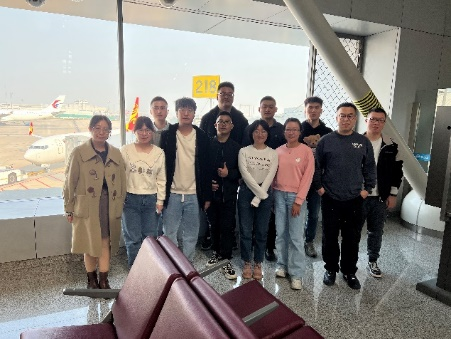
Group photo before departures on October 23 at Beijing capital airport
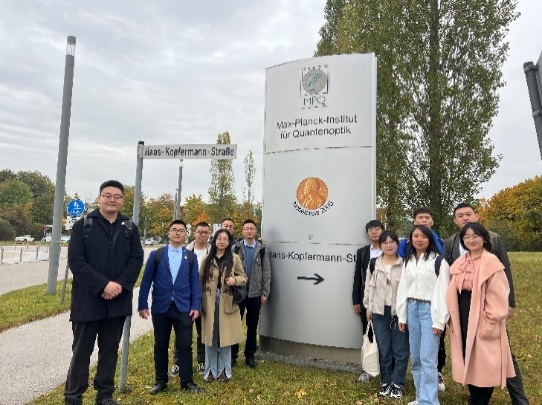
Group photo at TUM Max Planck Institute for Quantum Optics on October 24
The first stop of the academic exchange was the research group of Professor Oskar J. Haidn at the Technical University of Munich. Professor Haidn, an associate fellow of the American Institute of Aeronautics and Astronautics (AIAA), has served as director of the space propulsion department, combustion technology department, and numerical simulation department at the German Aerospace Center (DLR). In 2011, he was appointed director of the institute of space propulsion at TUM. Professor Haidn has authored numerous patents, books, and over 150 journal papers focusing on propellant optimization, ignition, spray combustion, heat and mass transfer, combustion diagnostics, and engine cooling. The majority of his work has been published in the Journal of Propulsion and Power, a top-tier aerospace journal under AIAA. With decades of experience in liquid rocket engine research, he specializes in investigating the mechanisms of cryogenic high-pressure effects and transient phenomena during engine startup and shutdown.
During the visit, Professor Haidn's doctoral students introduced the delegation to key laboratory facilities, research directions, and recent advancements. They provided detailed insights into cutting-edge studies on cryogenic high-pressure mechanisms and transient engine dynamics. The visiting students actively engaged in discussions, raising questions about propellant optimization, combustion diagnostics, and heat transfer. Professor Haidn patiently addressed each query while sharing his research philosophy. The exchange culminated in academic presentations by doctoral candidates Bai Chenxi and Chen Kun on their research achievements in pressurized oxygen-enriched combustion. Professor Haidn expressed strong interest in their work and praised its significant academic value and practical implications, highlighting the potential for future collaborative exploration.
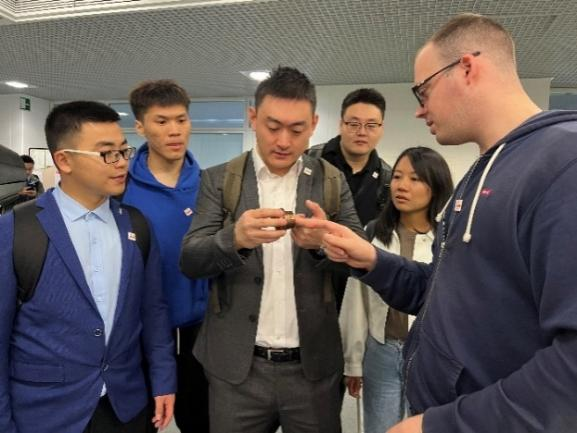
Visit Prof. Haidn’s lab on October 24
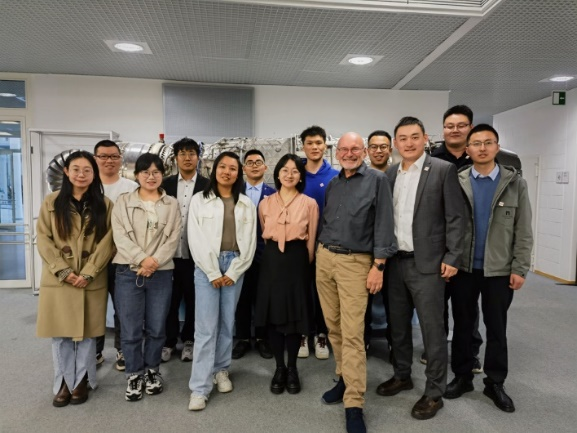
Group photo with Prof. Haidn
After that, the group went to the research group of Professor Wen Dongsheng, a National Distinguished Professor and recipient of the European Research Council (ERC) Consolidator Grant. Specializing in aerospace thermal physics, nanotechnology, and new energy systems, Professor Wen has authored over 240 SCI papers with over 10,000 citations. The session commenced with Professor Wen extending a warm welcome to the delegation. Professor Han Lei subsequently delivered a comprehensive overview of the history and organizational structure of Harbin Institute of Technology's School of Energy Science and Engineering. Doctoral candidate Yang Biao and Professor Li Lifeng then presented research reports on physical energy storage systems and experimental testing of solar thermochemical energy storage reactors, respectively. In-depth discussions ensued as both parties exchanged perspectives on the presented topics.
Following the academic presentations, the delegation toured laboratory facilities under the guidance of Professor Wen's doctoral students. During the visit, students actively engaged in technical discussions and posed insightful questions regarding experimental methodologies and instrumentation. Through these interactions with international peers, delegation members significantly expanded their academic perspectives while gaining deeper insights into global research frontiers.
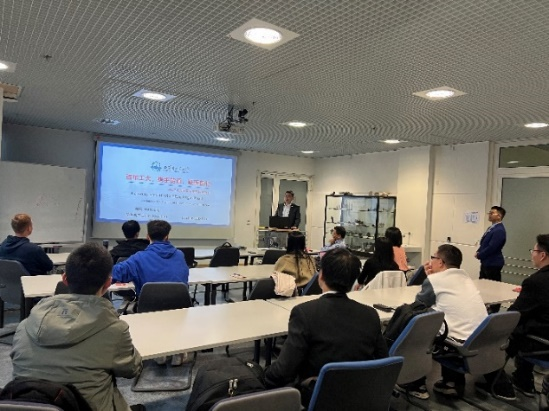
Prof. Han Lei is introducing HIT to Prof. Wen on October 24
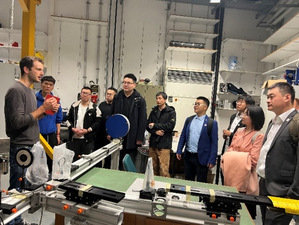
Visiting Prof. Wen’s lab on October 24
On the afternoon of October 25th, the group arrived by train at Friedrich-Alexander-Universität Erlangen-Nürnberg (FAU), and went to the research group of Dr.-Ing. Stefan Will. He is now the chair of engineering thermodynamics at FAU's thermal energy research center and executive director of its advanced optics institute. He is renowned as the developer of two-dimensional Laser Induced Incandescence (LII) technology. With expertise in optical measurement techniques, he has authored over 100 SCI-indexed publications. The professor extended a warm welcome to the delegation and provided a detailed introduction to his center's research focus, experimental infrastructure, and educational programs. The center boasts extensive expertise in energy conversion/storage technologies, energy systems, and intelligent manufacturing, having achieved significant scientific breakthroughs in these fields.
Professor Han Lei reciprocated with a targeted presentation on the historical evolution, current status, and strategic vision of Harbin Institute of Technology's School of Energy Science and Engineering. He emphasized the school's outstanding contributions to scientific research, talent development, and social services while expressing strong interest in deepening collaboration with FAU's Thermal Energy Research Center.
During the academic session, doctoral candidates He Xibo and Hu Qiming delivered presentations on experimental studies concerning renewable energy utilization and micro-mixing combustion respectively. Their comprehensive reports, detailing experimental procedures, data analysis, and conclusions, sparked vigorous discussions with Dr. Will and attending experts. The scholars highly commended the scientific rigor of the research and exchanged perspectives on potential collaborative extensions. The meeting concluded with the delegation presenting FAU commemorative medals to Prof. Will in recognition of his hospitality and valuable insights during the academic exchange.
Arrive to Erlangen’s train station on October 25 |
Group photo with Prof. Stefan Will on October 25 |
The fourth academic exchange took place at the research group of Dr Hu Xiangyu at TUM. Professor Hu, globally recognized for developing the open-source SPH (Smoothed Particle Hydrodynamics) algorithm library, has led multiple research projects funded by the German Research Foundation (DFG). With nearly 100 journal publications, he is work predominantly appears in top-tier journals including the Journal of Computational Physics, Computer Physics Communications, and Computer Methods in Applied Mechanics and Engineering, achieving an H-index of 31.
During the academic session, doctoral students from Professor Hu's team introduced the SPH algorithm—a numerical method for simulating fluid dynamics. Delegation members Wang Junli and Zhang Wei delivered in-depth presentations on gas dynamics and micro/nano-scale heat conduction respectively. Their reports systematically outlined fundamental theories, current research landscapes, and future trends in these fields, sparking vigorous discussions with attending experts.
Dr. Hu highly commended the scientific depth of both presentations, encouraging active questioning and interdisciplinary dialogue. He provided insightful recommendations emphasizing enhanced cross-disciplinary collaboration and expansion of research domains and applications. The session culminated in a dynamic atmosphere where students freely exchanged perspectives on diverse research topics.
Doctoral student from Dr. Hu’s lab is making academic presentations on October 26 |
Wang Junli is making academic presentations on October 26 |
Zhang Wei is making academic presentations on October 26 |
Group photo with Dr. Hu |
The final academic exchange was Professor Rafael Macian-Juán's research group at the Technical University of Munich (TUM). Professor Macian-Juán is currently the chair of nuclear engineering at TUM, brings over 25 years of expertise in nuclear safety analysis through computational methodologies, with more than 100 publications in high-impact international journals and conferences. His research focuses on multiphysics/multiscale nuclear safety simulations, uncertainty and sensitivity analysis methods, thermal-hydraulic experiments and modeling, medical applications of radiation transport, and nuclear reactor safety analysis with fuel design optimization.
The session commenced with doctoral researchers from Professor Macian-Juán's team presenting state-of-the-art nuclear safety analysis methods, followed by an innovative Monte Carlo-based framework for uncertainty quantification and sensitivity analysis developed through nonparametric statistics. These methodologies demonstrate robust applications in multiphysics coupling simulations, enabling evaluation of simulation fidelity, statistical validation of operational boundaries, and systematic assessment of model-data compatibility for nuclear reactor physics simulations.
Professor Li Xin and students Yang Biao and Gao Xuelin presentations on nonlinear flow of hydrocarbon fuels, physical energy storage systems, and coupled fluid-thermal transport phenomena. Their reports generated exceptional engagement, with faculty and students actively discussing technical nuances through interdisciplinary perspectives. The dynamic dialogue fostered innovative thinking for subsequent research directions.
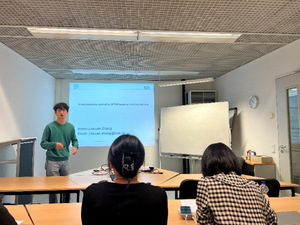
Doctoral student from Prof. Rafael Macian-Juán’s lab is making academic presentations on October 27
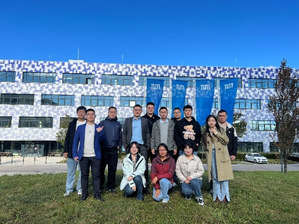
Group photo in TUM
This academic exchange program in Germany has provided invaluable academic resources and collaborative opportunities for faculty and students from Harbin Institute of Technology's School of Energy Science and Engineering, while infusing new momentum and vitality into the institution's future development. Through this initiative, participants gained a profound understanding of the strategic importance of international academic engagement. They emphasized their commitment to leveraging this experience as a catalyst for more active participation in global scientific collaborations, aiming to establish sustained mechanisms for knowledge exchange and interdisciplinary innovation.
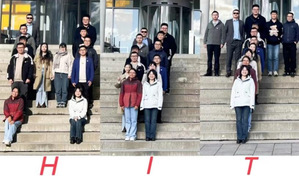
Group photo in the HIT formation at TUM to commemorate the occasion